
Issue 208
August 2024
Sean O'Malley’s swagger is backed by thoughtful dedication, and Fighters Only’s E. Spencer Kyte had an exclusive interview with his coach to get a read on the grit behind the glitz.
You see his over-the-top social media posts and brand deals. You see the podcasts and guest spots. The bouncy mop of vibrant curls and technicolor fits that force you to notice him. The brashness each time he comes face-to-face with the opponent who believes they’ve got Sean O’Malley all figured out. The truth is that it’s all the things you don’t see that make the reigning UFC bantamweight champion great.
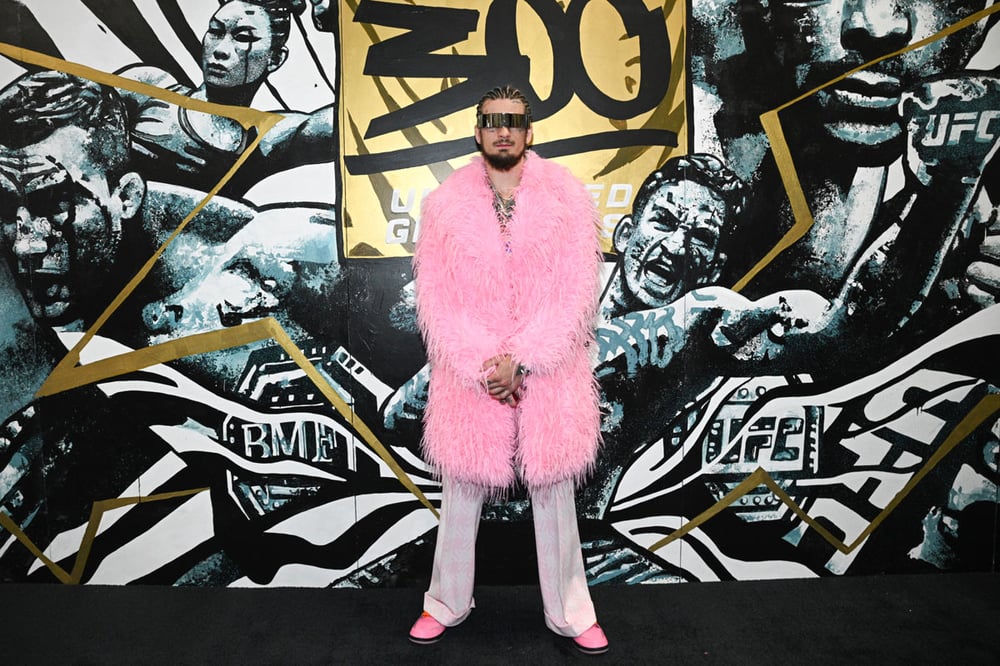
“He’s very smart in a lot of different ways, and he knows that the UFC is a show business,” begins Tim Welch, O’Malley’s head coach and the man he followed to The MMA Lab in Glendale, Arizona when he was an amateur with fewer tattoos. “He’s had that personality since he was young, and talking to him, it’s like, ‘Let it go. Let’s run with this. Keep being funny.' People love funny, so let’s keep being funny and let it go. He’s got some of the best social media brand deals I’ve ever seen, but him being funny, all the stuff you see online, what they don’t realize is that when the funny stuff goes away, we’re in the training room finding the toughest partners, putting him through the toughest workouts possible. It takes a lot of guts to have the curly hair and the tattoos and wear the stuff he has. If you do that, you better be a badass, and he knows that. He knows the number one thing is that he just has to keep winning. The stuff on top of that, he’s just good at it. But for sure, he’s always had the work ethic to back it up. He’s always the one 15, 20, 30 minutes early to training. Never misses a workout. He’s not the lazy type at all.”
The two have been connected since O’Malley’s amateur days when Welch was one of only a handful of fighters from their home state of Montana competing on television. They talked after one of O’Malley’s fights, and Welch invited him down to train in Arizona, where they set out on their quests to conquer the MMA world. When O’Malley would get a fight, Welch would shift into a coaching role. After back-to-back injuries forced the 34-year-old Welch to the sidelines, he focused on coaching. Welch’s last pro fight came five weeks after O’Malley’s breakthrough effort on the first season of Dana White’s Contender Series, where he registered a walk-off knockout win over Alfred Khashakyan, re-branding the program 'The Suga Show' and leaving Snoop Dogg shouting his name. Six years and one month later, O’Malley stopped Aljamain Sterling in the second round of the UFC 292 main event to claim the bantamweight title, climbing to the heights many forecasted he would reach while proving legions of doubters wrong.
BRING ON THE SPOTLIGHT
Tall, wiry, and covered in tattoos, O’Malley projects more of an ‘emerging Soundcloud rapper’ vibe than anything else, but there is much more to him than anyone knows.
“Every time we go and play any sport,” begins Welch, shaking his head as he speaks. “We go and play pickleball, we go and play basketball, we go and play baseball or football — he’s just a phenomenal athlete at all of these sports, and he’s really hyper-competitive. When it really stuck out to me was probably in his amateur career; he wouldn’t have the same emotions other people would have getting into a fistfight in front of your parents, in front of your friends, this huge audience. You’re about to fist-fight this kid and he’s in there smiling. He loves to be under the lights. If he wasn’t a fighter, he’d want to be performing somewhere. When there is so much on the line, he’s able to stay completely present. He’s not thinking about winning, not thinking about what happened in the past, who’s in the crowd — he’s very good at staying focused on the task at hand, and he’s a freak athlete.”
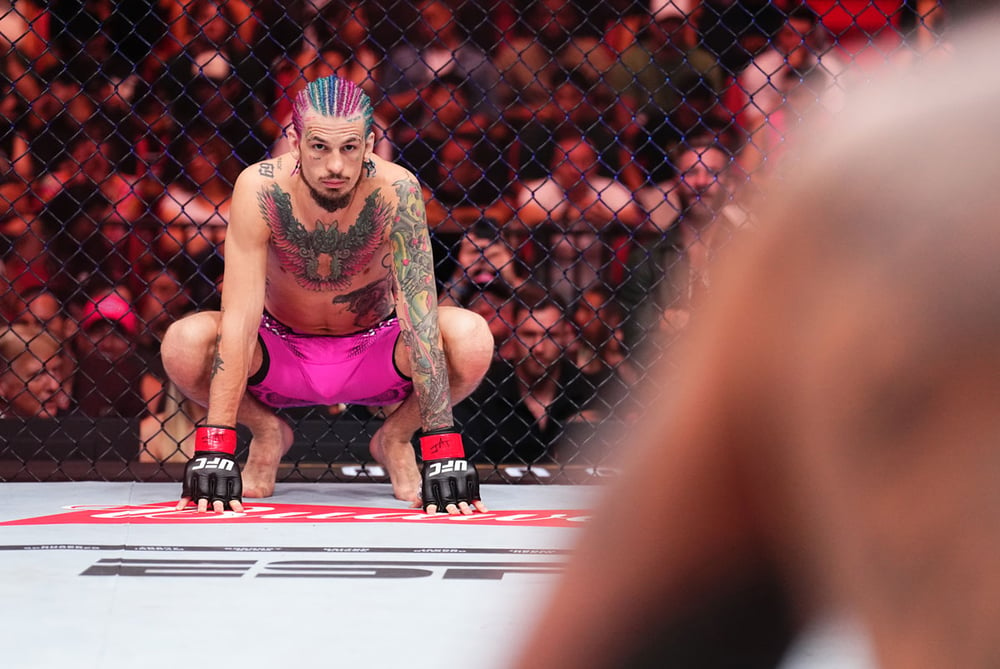
O’Malley’s ability to thrive in the spotlight is evident and has been since that night in the old Ultimate Fighter Gym in the summer of 2017 when he cracked Khashakyan to kick off this whirlwind adventure. That victory catapulted him onto the UFC roster, making him a must-watch prospect. Where the spotlight can cause some to shrink, the presence of an audience brought out the best in O’Malley, who crashed an open workout early in his career, eager to get in front of the crowd that had gathered to see his more established contemporaries get loose before they all competed on the weekend. With each appearance, each victory, and each new challenge, the 29-year-old has continued to stand taller and be a commanding presence whenever the lights are on.
BUILT DIFFERENT
Welch sensed that O’Malley had the potential early on but quickly noted that in an unforgiving and dangerous venture like mixed martial arts, the results don’t always translate.
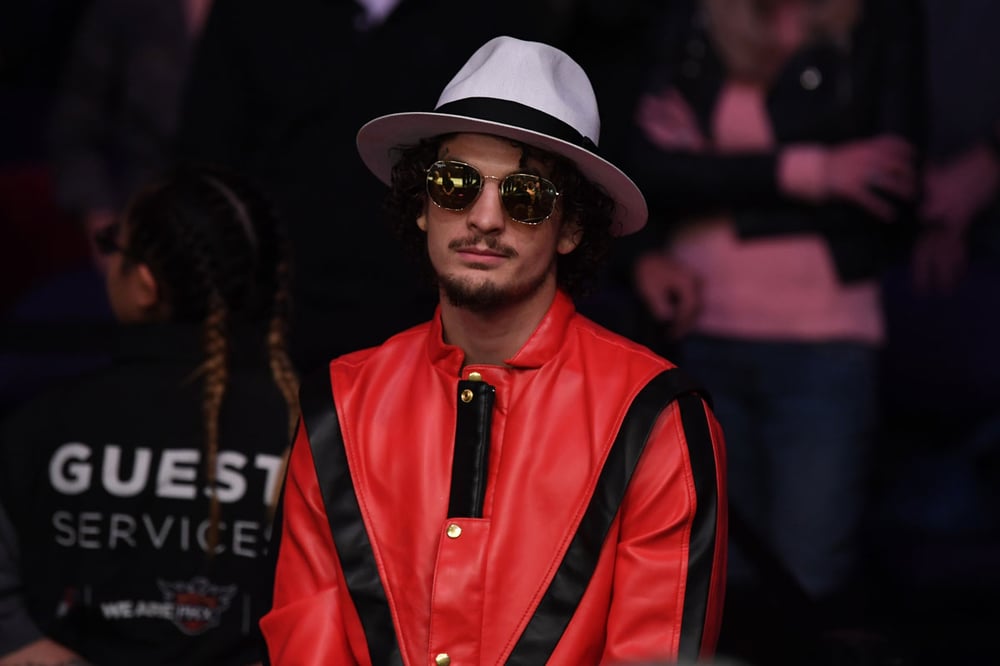
“I knew it pretty early on, but fighting is brutal; you don’t always get out what you put into this sport,” he says, stating a harsh truth few like to vocalize. “You saw it with the Contender Series — An (Tuan Ho) from The Lab. He’s so skilled, he has so much confidence, trains with a good team, does everything right, and one simple mistake, and he got KO’ed. This sport is heartbreaking. A lot of luck plays into it, but like I said, Sean is a special athlete, and when it comes to the big moments, he’s gonna show up.”
A lifetime could be spent figuring out what makes a good fighter great. Even then, there’s a good chance you couldn’t pinpoint a specific set of traits, talents, and intangibles. There is no sweet spot where the circles of this Venn diagram overlap with greatness in the middle. All anyone can do is find what works for them, commit to constant improvement, and see what happens once the cage door closes. There are pieces that Welch can point to that he believes differentiates his charge for others.
“I do think the meditation practice early on in his life, starting that, has helped a lot now that he’s gotten so big and there are so many eyes on him,” begins Welch. “He’s so good at bringing himself back to his breath, following his breath, bringing him back to that present moment. I think that’s a powerful thing. He’s also journaled everything about every fight he’s had in the UFC: what he weighed on this day, what he ate on this day, how many rounds he spared on this day. He logs everything. Now that we’re onto the second title defense, we have everything dialed in so perfectly for him, and really trust him. I trust that if he says, ‘I’m not training today,’ it’s not that he’s being lazy; it’s that he knows himself.”
POST CONTEST PREP
The other piece of the puzzle is the way the duo approaches things, especially after each contest.
“When you win, you’re not really winning— you’re thinking, ‘Okay, I’m doing what’s right,’ but from the beginning of his UFC career, we were like, ‘Let’s pretend we lost the fight.' What would we have done if we lost the fight? We’d pretend we lost the fight and then go back to the gym, back to grappling, back to jiu jitsu. We win the next fight — ‘Okay, let’s pretend we lost.’ The bank account doesn’t say so, and everything else doesn’t say so, but in our minds, let’s say that we lost because when you lose, you want to get better; you’re hungry to get better, and you get motivated. That’s our mindset after each fight: ‘Let’s pretend we lost.’”
It goes ever deeper than that retrospective mindset. Given his flamboyance and social media, you might think that a night after an O’Malley victory brings an excess of excess. However, after winning the bantamweight title last summer in Boston, Welch said they landed back in the hotel and didn’t do what everyone expected.
“Usually after, he’s pretty normal,” he says. “We like to sit — we usually stay up really late, watch the fight probably 50 times. In Boston, we went back to the hotel, there were some pizzas that came, and we sat down and just watched the fight over and over and over and over.”
I joke that they sound like my kind of sickos — lunatics obsessed with every element of the sport, constantly wanting to consume as much as they can to better themselves — and Welch laughs, agreeing with the assessment.
“I’ve never been around someone,” he begins, pausing to find the right way to express his thoughts. “(Sean) watches his sparring religiously. He watches his fights hundreds and hundreds of times, just sits there watching himself. That’s one thing I think has a big impact.”
DRIVEN TO SUCCEED AND SILENCE THE DOUBTERS
Last summer, before his title clash with Sterling at UFC 292, I spoke with O’Malley for the UFC website, and his strength of schedule ahead of the contest was one of the main topics of conversation. Critics said he was being protected, fighting a hand-picked set of favorable foes to ensure he kept winning. Moderates acknowledged that he wasn’t exactly fighting a Murderer’s Row of opposition but that you can only fight the people the UFC matchmakers put in front of you. It’s not necessarily up to the athlete to demand stiffer competition. O’Malley had heard all the criticism but countered with the most precise response possible when I asked him about it.
“You don’t beat Petr Yan if you’re not as good as I am,” he said, pointing to his split decision win that cemented his standing as the No. 1 contender. “Petr isn’t a guy you just accidentally beat.”
That’s the part the critics still don’t seem to want to accept, and it’s a part of what drives O’Malley to continue working as hard as he does.
“He wants the absolute biggest fights possible,” says Welch when asked about the looming challenges. “He wants the fights where people think, ‘Oh, you’re gonna get f****** killed!’ like the Aljo fight, Petr Yan. You’re gonna get killed! Chito’s gonna beat your ass again!’ He loves those fights where people think he’s gonna get his ass whooped, and he’s gonna get smoked. He’s looking for the biggest fight possible.”
Some are likely to argue that if he were looking for the biggest fights possible, his first title defense wouldn’t have come against Marlon ‘Chito’ Vera. Chito is a dangerous but not elite talent who had lost to Cory Sandhagen two fights earlier and was selected based on having beaten O’Malley when they faced off four years earlier.
THE TRUTH
The Vera fight is fair criticism, but one that is now countered by the fact that the champion’s next opponent is the No. 1 contender, Merab Dvalishvili. The Georgian grinder has been getting under O’Malley’s skin since he stole his Michael Jackson Thriller jacket. Dvalishvili brings elements we’ve yet to see O’Malley contend with: relentless pressure, a bottomless gas tank, and a wrestling-based approach focused more on repeatedly returning opponents to the canvas.
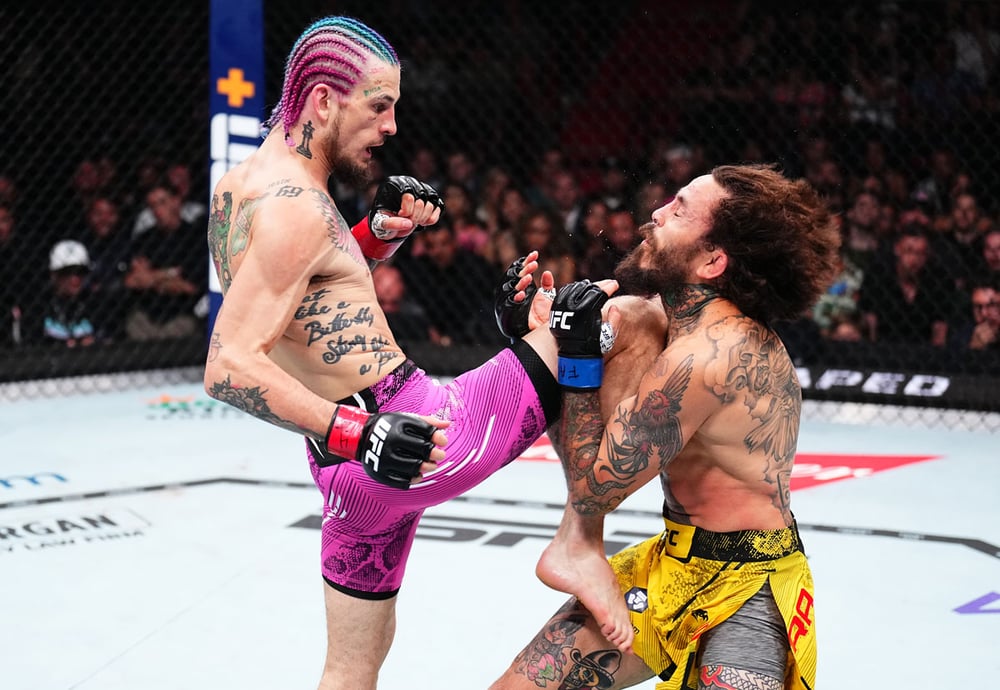
On his way up the divisional ladder, the high-motor contender has rallied to stop Marlon Moraes, neutralized Jose Aldo, dominated Petr Yan, and out-wrestled Olympic gold medalist and former two-division champion Henry Cejudo to hit his championship clash with O’Malley at UFC 306 — officially branded as Riyadh Season presents Noche UFC — on a 10-fight winning streak.
“Merab is a machine,” Welch says when asked about O’Malley’s next challenger. “He’s on a 10-fight winning streak against Jose Aldo, Henry Cejudo, Petr Yan — he is an actual machine, and if you don’t show up on that day, he is going to run you over. Someone who is not scared to shoot 50 times is a scary person. But we also know how tall he is, and I’ve seen Sean spar guys that tall. We also know what he has to do — he has to grab his leg; he has to take him down. The game plan against Sean is to take him down, and everyone thinks they’re gonna be able to until he gets in front of them, and they see how fast-twitch he is, and they get hit, and they don’t know where it came from, and the whole thing changes. Merab really loads up, and he really bites down. When he’s gonna go, he’s gonna go, and when we show up on — which Sean is gonna show up on — I just feel like in my heart that it’s gonna be a short night for Merab.”
AN ONGOING, INCREDIBLE JOURNEY
Every fighter in this sport says they want to be a UFC world champion and may have the skills to make that dream real. The grind of trying to reach the highest level cuts down many of them. Even those who continue to press forward often don’t reach the heights they aspire to early on.
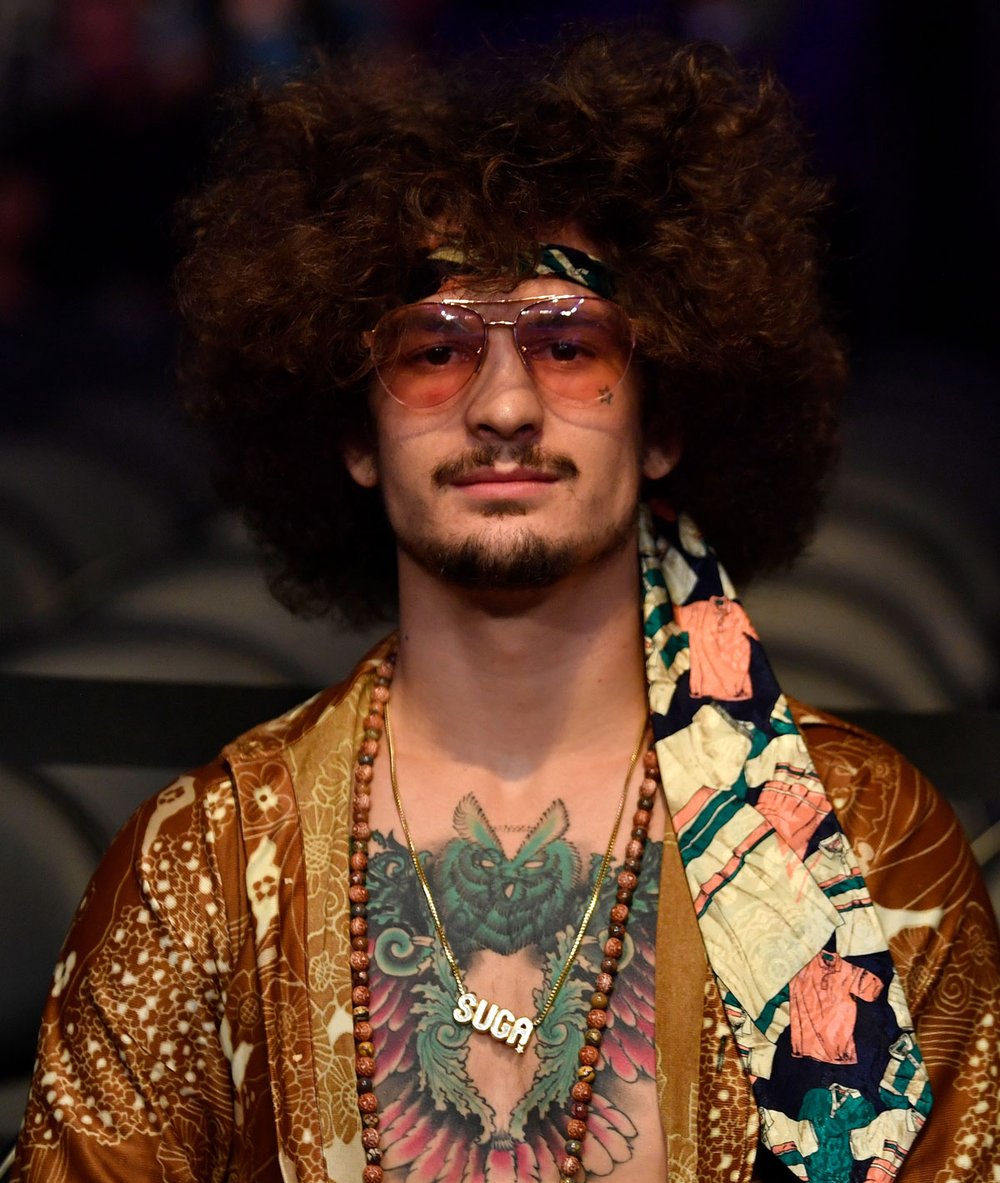 “It’s been — it’s hard to even explain,” he begins, searching for a way to convey what he’s feeling about what all of this has meant to him. “We’re literally living our dreams out, but for me, it’s put a lot of pressure. I know he trusts me, and I know he’s a high-level athlete, so it keeps putting pressure on me to keep trying to learn from different people. Keep learning, keep growing, and never stay stagnant because there is an unlimited amount of things you can learn. That’s what I think we’ve both been good at through our whole friendship this past 10 years is constantly trying to improve our health, constantly trying to improve our brain, constantly trying to improve in every martial art. Constantly trying to improve is the main thing. I’m just really grateful. Grateful to have a good friendship with Sean and that he looked up to me; grateful for The MMA Lab and all the people around me that I get to learn from.”
“It’s been — it’s hard to even explain,” he begins, searching for a way to convey what he’s feeling about what all of this has meant to him. “We’re literally living our dreams out, but for me, it’s put a lot of pressure. I know he trusts me, and I know he’s a high-level athlete, so it keeps putting pressure on me to keep trying to learn from different people. Keep learning, keep growing, and never stay stagnant because there is an unlimited amount of things you can learn. That’s what I think we’ve both been good at through our whole friendship this past 10 years is constantly trying to improve our health, constantly trying to improve our brain, constantly trying to improve in every martial art. Constantly trying to improve is the main thing. I’m just really grateful. Grateful to have a good friendship with Sean and that he looked up to me; grateful for The MMA Lab and all the people around me that I get to learn from.”
As far as Welch is concerned, there is still room for the UFC champion to upskill, and he likely will because even though he’s reached the top of the division, O’Malley doesn’t believe he has reached his full potential.
“Growth-wise, he could still grow a lot,” says Welch. “He’s such a good athlete, and if he wants to learn something, he’s gonna learn it. The sky is the limit when it comes to grappling for him. On the feet, he’s just another level right now. He’s so scary, and he has so much confidence in his range. His vision is so good, his reaction time is so good, his balance is so good, combined with that athleticism, combined with his ability in those big moments — that’s a championship-level athlete right there. He knows what he’s capable of, and he wants to reach his full potential.”
Behind the flashy curls and swagger, Sean O'Malley is all business—he’s a knockout artist who grinds every day to always be better than his former self. This mindset isn't just a fast-digesting Suga-Show. Instead, it's a calculated slow march to the top, where he aims to cement himself for a very long time.










